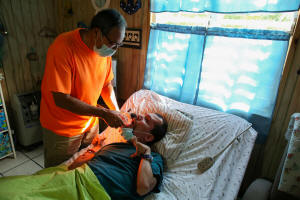U.S. Supreme Court weighs Puerto Rico's exclusion from benefits program
 Send a link to a friend
Send a link to a friend
[November 09, 2021]
By Lawrence Hurley
WASHINGTON (Reuters) - The U.S. Supreme
Court on Tuesday is set to weigh the legality of a decades-old
congressional decision to exclude Puerto Rico from a federal program
that provides benefits to low-income elderly, blind and disabled people.
The justices are hearing the U.S. government's appeal of a lower court
ruling that deemed Puerto Rico's exclusion from the Supplemental
Security Income (SSI) program unlawful.
The appeal originally was filed by Republican former President Donald
Trump's administration. His Democratic successor Joe Biden has continued
the appeal while at the same time urging Congress to extend SSI to
Puerto Rico.
Many Puerto Ricans have long complained that the Caribbean island's
residents are treated worse than other Americans despite being U.S.
citizens. Puerto Rico, which is not a state, is the most-populous of the
U.S. territories, with about 3 million people.
The case involves a Puerto Rican resident named Jose Luis Vaello-Madero
who received SSI benefits when he lived in New York but lost eligibility
when he moved to Puerto Rico in 2013.

The Supreme Court has been instrumental in defining the legal status of
Puerto Ricans dating to a series of rulings starting more than a century
ago called the Insular Cases, some suffused with racist language. The
rulings endorsed the notion that the people of newly acquired U.S.
territories could receive different treatment than citizens living in
U.S. states. Vaello-Madero's case gives the justices an opportunity to
revisit those rulings.
The Boston-based 1st U.S. Circuit Court of Appeals ruled last year in
favor of Vaello-Madero, deciding that Puerto Rico's SSI exclusion
violated a provision of the U.S. Constitution that requires that laws
apply equally to everyone.
Vaello-Madero, who is 67 years old and disabled, mounted his
constitutional challenge after the government sued him in federal court
in Washington in 2017 seeking more than $28,000 for payments it made to
him after he moved to Puerto Rico.
[to top of second column]
|

Abraham Rivera Berrios gives a glass of water to his son Emanuel
Rivera Fuentes, 35, who was born severely disabled and needs
constant care, at his home, in Toa Alta, Puerto Rico, September 22,
2021. Picture taken September 22, 2021. REUTERS/Alvin Baez

The government's lawsuit was filed a month before
Vaello-Madero lost the roof of his home in Hurricane Irma, which was
followed weeks later by the devastating Hurricane Maria.
SSI benefits are available to U.S. citizens living in any of the 50
states, Washington, D.C., and the Northern Mariana Islands, but not
the territories of Puerto Rico, the U.S. Virgin Islands and Guam.
Congress decided not to include Puerto Rico when it enacted the
program in 1972. Puerto Ricans are eligible for a different
government program, called Aid to the Aged, Blind and Disabled, that
allows for more local control but not as much federal funding, the
Justice Department said in court papers.
The Supreme Court's ruling is due by the end of June.
Biden said in June that the existing law's denial of SSI benefits to
residents of Puerto Rico is "inconsistent with my administration's
policies and values" and asked lawmakers to amend the statute to
extend the benefits to the territory.
After passing infrastructure legislation on Saturday, congressional
Democrats are working to finalize a massive social spending bill,
the latest draft of which includes a provision extending the
benefits to Puerto Rico. If that legislation passes, it would limit
the importance of the Supreme Court's eventual ruling.
(Reporting by Lawrence Hurley; Editing by Will Dunham)
[© 2021 Thomson Reuters. All rights
reserved.] Copyright 2021 Reuters. All rights reserved. This material may not be published,
broadcast, rewritten or redistributed.
Thompson Reuters is solely responsible for this content.
 |